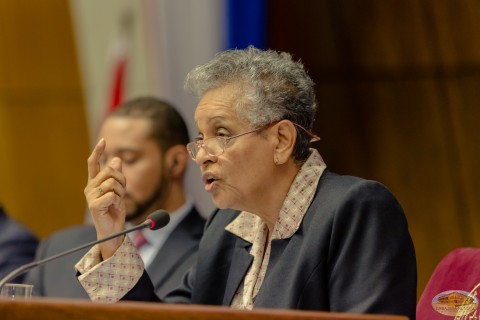Democratization of the UN, classification of ethnocide and politicide: proposals of CUMIPAZ 2016
Justice and Democracy Session / Panel 2
International Public Law and International Criminal Law were the judicial approaches that the second panel of the Justice and Democracy Session of CUMIPAZ 2016 was based on, with the objective of generating “Proposals for the democratization of the UN, the elimination or rationalization of the right to veto, and the classification of politicide and ethnocide”.
The judicial encounter was developed in the Bicameral Chamber of the Congress of Paraguay, host of the Summit, with the participation of:
- Camilo Montoya Reyes, magistrate of the High Council of the Judicature of Colombia,
- Tommy Calvert, Commissioner of the County of Texas, United States,
- Yolanda Perez Ruiz, assistant attorney general of Guatemala,
- And Luis Antonio Ortiz, magistrate (E) of the Supreme Court of Justice of Venezuela, moderator of the panel.
The debates and approaches that where given in this session are intended to reach a consensus of proposals that, through the Global Embassy of Activists for Peace (GEAP), organization that organized CUMIPAZ, will be taken to competent organizations so its implementation can be studied.
The Democratization of the UN
 The assistant attorney general of Guatemala stated that the existence of the Security Council in its composition and its operation, is anti-democratic, it violates the principles of equality among the member States and the interest of the permanent members is more important in their decisions.
The assistant attorney general of Guatemala stated that the existence of the Security Council in its composition and its operation, is anti-democratic, it violates the principles of equality among the member States and the interest of the permanent members is more important in their decisions.
“The existing seats in the Security Council should expand and satisfy the principle of proportionality and regional representation”, she stated.
“Because they speak of various options; one of them, instead of speaking of a permanent member country of the Security Council, we should speak of a permanent continent of the Security Council (…) each continent will have a representative in the Security Council”.
Commissioner Tommy Calvert expressed: “Peace begins at home, not at the United Nations, it begins in our countries with our leadership; peace begins by giving every person, be it, minorities’ o populations, a good education so that our people can have a better economy, and so that our countries can be stronger.”
Ethnocide and Politcide
This thematic was centered on the characterization and introduction of politicide and ethnocide, if possible, within the same foundation that is established in the Crime of Genocide in the Rome Statute (Art. 5).
Montoya spoke on the proposals of the GEAP, which has to do with placing the national group, the ethnical group as the passive subject of the crime, rather than the political group; placing attack against that human group that has permanence, consistency and characteristics that identify them.
“Legal right, in addition to existence, is the integrity of the group. The attack against the cultural integrity of that ethnicity, of that Afro-descendant group, for example; displacing an indigenous group from their land is a way of destroying them, those are ethnocidal behaviors”, he explained.
Meanwhile, Assistant Attorney General, Yolanda Perez, stated: “What we seek with a criminal offense like politicide, is that life should be protected. But also, to protect the guarantees of political participation, free of any threat”. In that sense, she supported the proposals stated by the GEAP.
Tommy Calvert spoke of his experience, as a leading member of the United States Government, of the law for the declaration of the genocidal conflict in Sudan, the first in the history of the United States.
He said: “We have a long way to go in justice and there are many models in which justice can take place; such as political assassinations, genocide”.
